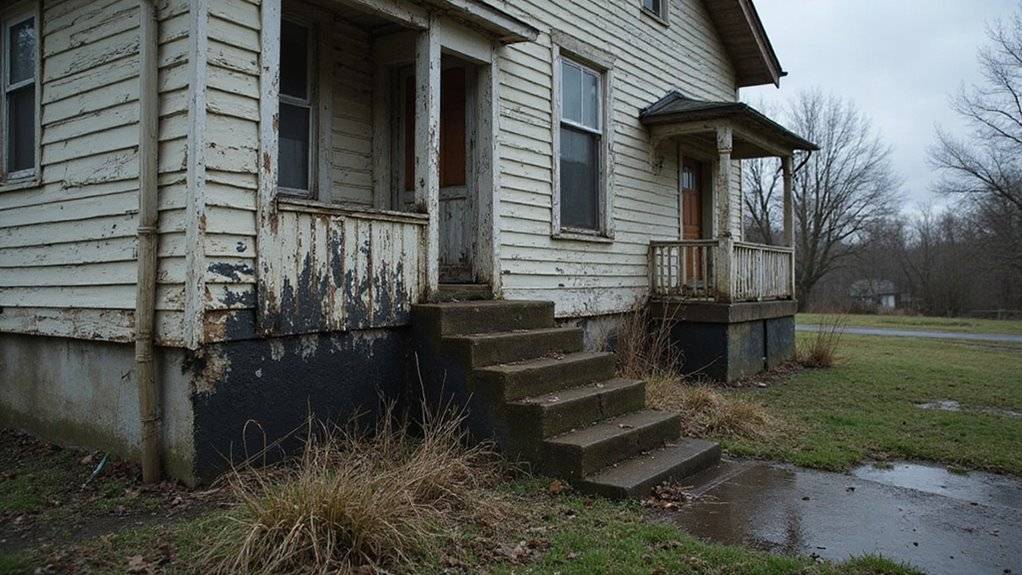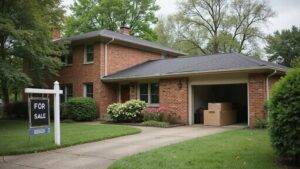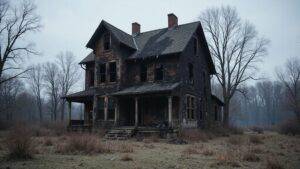Selling a house with mold or water damage in Virginia is a tough challenge. These problems can lower your property’s worth fast. They also pose health risks and structural issues. Homebuyers may hesitate, making the sale process stressful and slow.

Moreover, mold and water damage can scare off potential buyers. Legal disclosure rules in Virginia are strict. Failing to report these issues can lead to lawsuits. This adds more pressure to an already tough situation. But don’t worry, there are ways to handle this.
We’ll guide you through selling a house with mold or water damage in Virginia. You can choose repairs or sell as-is. Practical tips and legal advice will ensure a smoother sale. This blog will help you solve these issues with clear, actionable steps.
Key Takeaways
- Selling a house with mold or water damage in Virginia requires full disclosure of known issues under state law.
- As-is sales to cash buyers like Align Real Estate Solutions offer quick closings without repair needs.
- Mold and water damage can lower property value and marketability if not addressed promptly.
- Hire professionals for thorough inspections to identify hidden mold or water damage before selling.
- Document all damages and past insurance claims for transparency with potential buyers.
Understanding Mold and Water Damage Impact

Mold and water damage in Virginia homes can seriously lower property value. These issues also hurt marketability if ignored. Humidity in summer often boosts mold growth significantly. Heavy rains might worsen water leaks in your home. If damage appears, act quickly to prevent further issues.
Thankfully, new technology can help solve these problems. Tools like moisture detectors find hidden damp spots easily. Thermal imaging shows issues that you might miss otherwise. If you use these methods, you’ll understand the damage better. Stay alert and always evaluate your property thoroughly before selling. Additionally, selling a home with such damages is possible with cash home buyers who purchase properties as-is.
Types of Water Damage and Mold Issues
As you assess your property in Virginia, you’ll notice that water damage and mold can lead to serious structural damage, weakening foundations and walls. You should also be aware of health concerns, as mold exposure can trigger allergies or respiratory issues for you and potential buyers. Additionally, watch for hidden problems behind walls or under floors, as these can affect insurance coverage and complicate your sale. Fortunately, some buyers in Virginia offer to purchase homes in any condition, eliminating the need for costly repairs before selling.
Structural Damage
Many Virginia homeowners face structural damage from water and mold in their homes. Water infiltration can weaken your home’s foundation, leading to cracks. Mold often worsens the issue by damaging wooden beams and drywall. This reduces the overall strength of your property. If seismic activity occurs, weakened foundations may fail during tremors. Poor seismic resistance becomes a serious risk in such cases.
You should act quickly to stop further damage to your home. Inspect basements and crawl spaces for signs of trouble. If damage seems severe, hire professionals for a thorough check. They can ensure your home stays safe and valuable.
Health Concerns
Water damage and mold in your Virginia home can cause serious health risks. Mold spores may trigger allergies and asthma. They can also worsen respiratory problems if you have existing conditions. Damp spaces breed bacteria and allergens too. These issues can harm your well-being over time.
Don’t believe myths that mold is safe; it’s a real threat. If you notice moisture, act quickly to fix it. Ensure good ventilation to prevent dampness in your home. Use dehumidifiers in areas like basements if needed. If leaks appear, repair them without delay. Should you suspect mold, watch for symptoms like coughing. If fatigue or breathing issues occur, consult a professional. Your health matters most when handling such problems.
Hidden Problems
Hidden issues in your Virginia home can be dangerous. Water damage and mold often stay unseen until severe. Leaky pipes or roof cracks may invite moisture. This can lead to toxic mold in hidden spots.
If ignored, these issues might hurt your property’s value. Tax Liens or Zoning Issues could worsen the situation. Buyers may avoid homes with unresolved damage. Inspect crawl spaces, attics, and basements often. If you act early, you can avoid costly repairs. This will keep your home valuable in Virginia’s market.
Insurance Coverage
Discovering hidden issues like water damage or mold in your Virginia home requires understanding insurance protection. Standard homeowners’ policies often cover sudden water damage from burst pipes. They usually exclude gradual leaks or flood damage. If mold relates to a covered water event, coverage might apply. Always check your policy for specific details.
Health Insurance could help with medical issues from mold exposure if treatments are needed. Travel Coverage may assist if you’re displaced during home repairs. It can cover temporary accommodations in such cases. Review all policies carefully to understand your benefits. Consult your insurer for clarity on claims. Document all damages thoroughly to support your case.
How to Address Mold and Water Damage

If you’re dealing with mold or water damage in your Virginia home, start by getting a professional assessment to pinpoint the extent of the issue. Then, investigate remediation options and analyze the costs to determine the most effective and affordable solution. Finally, ensure you’ve got proper documentation of all damage and repairs, as this will be critical for potential buyers or legal requirements. Additionally, consider selling your home as-is to a cash buyer who can handle all repairs after purchase, saving you time and money on costly fixes with as-is purchases.
Professional Assessment
When facing mold or water damage in your Virginia home, a professional assessment is essential. Experts can identify the full extent of damage quickly. Hidden issues might grow worse if ignored. So, hire a certified inspector for an honest check. They follow strict ethics for a fair evaluation.
Don’t try to check the damage on your own. Professionals use special tools to find hidden problems. Their training helps spot issues you could miss. If you skip this step, risks might increase. They’ll give a clear report on severity and health concerns. With their help, you can decide the next steps for your Virginia property. Trust experts to guide you properly.
Remediation Options
Mold and water damage in your Virginia home need quick action. If ignored, they can worsen and harm health. Consider Eco Remediation methods for a safe fix. These use green products to remove mold without toxic chemicals. They protect your family and the environment effectively.
Explore Tech Solutions like modern dehumidifiers for moisture control. Use detection tools to find water damage sources fast. Hiring experts with advanced drying technology is also wise. If you combine these methods, your home will recover soon. This ensures safety for buyers or personal comfort.
Cost Analysis
Tackling mold and water damage in your Virginia home starts with a clear Cost Analysis. You need to evaluate expenses carefully. Begin by setting a budget to understand your financial limits. Prioritize urgent repairs if funds are tight. Gather several quotes from experts for accurate cost comparisons. Never compromise on quality to avoid future problems.
Consider the benefits of each remediation option before deciding. Thorough work might cost more initially but saves money later. If you choose cheaper fixes, issues could return and increase expenses. Weigh all factors to protect your home’s value. Stay within budget while aiming for lasting solutions. Make wise decisions for the best outcome.
Documentation Needs
How can you handle mold and water damage smoothly in your Virginia home? Proper documentation ensures clarity and legal safety. It helps you stay transparent and protects your interests. If you document well, you build trust with buyers.
Keep your records organized with simple methods. Here are key documents to gather:
- Inspection Reports – These show hidden mold issues in your home.
- Repair Invoices – They prove you fixed the damage properly.
- Disclosure Forms – These forms legally inform buyers about past issues.
With these records, you can show a clear history. If issues arise, you’re protected and compliant. Trust and honesty matter when selling with Align Real Estate Solutions.
Legal Requirements for Selling
When selling a house with mold or water damage in Virginia, you must understand the state’s disclosure laws that require you to inform potential buyers about known issues. You’re also obligated to comply with inspection requirements and health regulations to ensure the property meets safety standards. Additionally, if you’ve filed insurance claims for damage, you’ll need to provide documentation to avoid legal complications. For a hassle-free solution, consider a cash offer from buyers who purchase properties in any condition, regardless of damage or needed repairs.
Disclosure Laws
Virginia’s disclosure laws require sellers to reveal known house issues like mold or water damage. If you’re selling, honesty is mandatory. Hiding problems can lead to lawsuits or penalties. While rules differ across states, Virginia values transparency. Non-compliance could bring severe fraud penalties.
Consider these risks of concealment:
- A musty basement might hide mold, surprising buyers later.
- A soggy ceiling could show past leaks, raising doubts.
- A legal notice may arrive, warning of deception costs.
Stay honest; it’s both ethical and required by law.
Inspection Requirements
Handling Virginia’s inspection requirements is vital when selling a home with mold or water damage. As a seller, you must ensure your property meets state standards before closing. Virginia law may not always require specific inspections. However, buyers or lenders might demand them, so be ready. If issues arise, address them quickly to avoid delays.
Focus on Electrical Inspections to ensure wiring and systems are safe. Also, check Zoning Compliance for local regulation adherence. If non-compliance occurs, legal problems could follow. Addressing these early prevents unexpected issues during the sale. Partner with experts to navigate this process smoothly.
Health Regulations
To ensure compliance, follow Virginia’s strict health laws when selling a house with mold or water damage. You must disclose all known problems to protect buyers. If issues exist, address them before listing your property.
Here are key steps to follow:
- Inspect Carefully: Conduct a full check of your home for hidden mold in damp areas.
- Record Problems: Write a clear report detailing any water damage for transparency.
- Fix Safely: Hire experts to remove hazards using proper protective gear.
Insurance Claims
Selling a house with mold or water damage in Virginia requires understanding insurance claims. These claims can affect your sale if unresolved. You must tell buyers about past water or mold claims. Virginia law demands full honesty in disclosures. If claims are denied, it might delay your transaction.
A policy lapse could mean no coverage for old damages. This leaves you responsible for costly repairs. Always check your insurance policy before listing the house. Review your claim history to spot any issues. If there are problems, consult your insurer quickly.
Handling insurance properly protects your sale and builds trust. If you clarify issues, buyers will feel more confident. Be prepared for questions about past damages. Clear answers can prevent legal troubles later. Good management ensures a smoother selling process.
Options for Selling Water-Damaged Houses

If you’re selling a house with water damage in Virginia, you’ve got several paths to consider, including as-is sales, post-remediation sales, price adjustments, and targeting specific buyer types. You can opt to sell the property in its current state to avoid repair costs, or remediate the damage first to potentially boost the sale price while adjusting offers to reflect any lingering issues. Knowing your buyer—whether traditional, investor, or cash buyers like Align Real Estate Solutions—can also shape your strategy for a smoother transaction. Additionally, companies that buy houses in any condition can provide a quick solution with no repairs needed, ensuring a hassle-free sale even for properties with significant water damage.
As-Is Sales
Selling a house with water damage or mold in Virginia is easier with an as-is sale. This choice lets you sell the property as it is, without making repairs. If you work with firms like Align Real Estate Solutions, expect fast closings and flexible terms. Their support ensures a simple and quick process for homeowners.
Picture these benefits during an as-is sale:
- No repair worries – You can avoid fixing any damage before selling.
- Quick deals – Transactions might close in just a few days.
- Easy paperwork – Experts could help with every legal step smoothly.
Choosing an as-is sale offers speed and ease, even if your home has issues.
Post-Remediation Sales
Selling your water-damaged house in Virginia after remediation can simplify the process. If issues like mold are fixed, buyers feel more confident. They trust the home is safe and secure. Highlighting repairs in your listing shows the property’s improved state.
Use effective marketing to present your house well. Professional photos can display the renewed areas clearly. Detailed descriptions of repairs build transparency with buyers. If you want a quick sale, partner with Align Real Estate Solutions. We ensure a smooth and certain transaction in Virginia.
Price Adjustments
Pricing a water-damaged house in Virginia requires careful thought. You must adjust based on current market trends. Analyzing recent sales helps set a realistic price. This reflects the property’s true condition.
Consider these key pricing factors:
- Visible Damage: Cracked walls and stained ceilings can lower buyer interest.
- Repair Costs: High costs for hidden water damage may scare buyers.
- Local Comparisons: Nearby homes in better shape often sell quicker.
If you use strong negotiation skills, you can defend your price. Highlight remediation work to show value. This ensures you don’t undersell in Virginia’s active market.
Buyer Types
Finding the right buyer for a water-damaged house in Virginia starts with knowing your options. First Time Buyers often want cheap homes. If you price fairly and disclose issues, they might see a fixer-upper chance. Luxury Buyers usually skip homes needing big repairs. Unless the location is top-notch and damage small, they aren’t ideal. Cash buyers, like Align Real Estate Solutions, buy homes as-is. They manage paperwork and legal issues for you. This ensures a quick and easy sale. If you target the right group, your sale chances improve. Identify your buyer pool wisely to succeed.
Get a Fair Offer on Your Damaged House from Align Real Estate Solutions
Selling a damaged house can be tough, but Align Real Estate Solutions makes it easy. As a trusted cash buyer in Virginia, we offer fair bids and clear deals. If your home has mold or water damage, we’ll buy it as-is. You won’t need to fix anything before selling.
Picture the benefits of working with us. You can skip expensive repairs like mold removal. If time is tight, we close deals fast, often in days. Imagine avoiding stress by letting us handle legal issues. With our help, selling becomes simple and quick. Our process ensures quick closings without delays from financing or inspections. Contact Align Real Estate Solutions today for a fair price. If you’re ready, we’ll start the process now!








